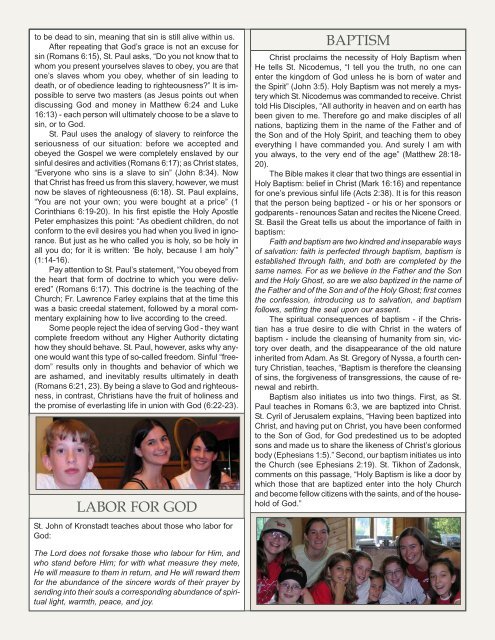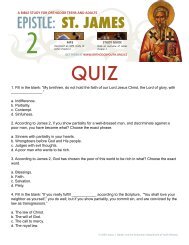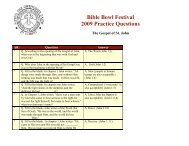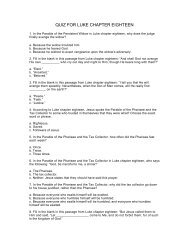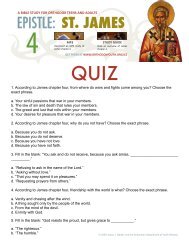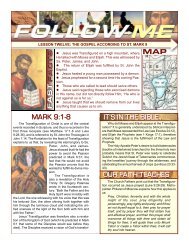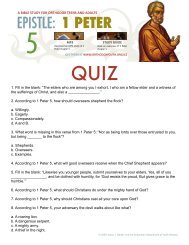to download - Orthodox Christian Bible Studies
to download - Orthodox Christian Bible Studies
to download - Orthodox Christian Bible Studies
You also want an ePaper? Increase the reach of your titles
YUMPU automatically turns print PDFs into web optimized ePapers that Google loves.
<strong>to</strong> be dead <strong>to</strong> sin, meaning that sin is still alive within us.<br />
After repeating that God’s grace is not an excuse for<br />
sin (Romans 6:15), St. Paul asks, “Do you not know that <strong>to</strong><br />
whom you present yourselves slaves <strong>to</strong> obey, you are that<br />
one’s slaves whom you obey, whether of sin leading <strong>to</strong><br />
death, or of obedience leading <strong>to</strong> righteousness” It is impossible<br />
<strong>to</strong> serve two masters (as Jesus points out when<br />
discussing God and money in Matthew 6:24 and Luke<br />
16:13) - each person will ultimately choose <strong>to</strong> be a slave <strong>to</strong><br />
sin, or <strong>to</strong> God.<br />
St. Paul uses the analogy of slavery <strong>to</strong> reinforce the<br />
seriousness of our situation: before we accepted and<br />
obeyed the Gospel we were completely enslaved by our<br />
sinful desires and activities (Romans 6:17); as Christ states,<br />
“Everyone who sins is a slave <strong>to</strong> sin” (John 8:34). Now<br />
that Christ has freed us from this slavery, however, we must<br />
now be slaves of righteousness (6:18). St. Paul explains,<br />
“You are not your own; you were bought at a price” (1<br />
Corinthians 6:19-20). In his first epistle the Holy Apostle<br />
Peter emphasizes this point: “As obedient children, do not<br />
conform <strong>to</strong> the evil desires you had when you lived in ignorance.<br />
But just as he who called you is holy, so be holy in<br />
all you do; for it is written: ‘Be holy, because I am holy’”<br />
(1:14-16).<br />
Pay attention <strong>to</strong> St. Paul’s statement, “You obeyed from<br />
the heart that form of doctrine <strong>to</strong> which you were delivered”<br />
(Romans 6:17). This doctrine is the teaching of the<br />
Church; Fr. Lawrence Farley explains that at the time this<br />
was a basic creedal statement, followed by a moral commentary<br />
explaining how <strong>to</strong> live according <strong>to</strong> the creed.<br />
Some people reject the idea of serving God - they want<br />
complete freedom without any Higher Authority dictating<br />
how they should behave. St. Paul, however, asks why anyone<br />
would want this type of so-called freedom. Sinful “freedom”<br />
results only in thoughts and behavior of which we<br />
are ashamed, and inevitably results ultimately in death<br />
(Romans 6:21, 23). By being a slave <strong>to</strong> God and righteousness,<br />
in contrast, <strong>Christian</strong>s have the fruit of holiness and<br />
the promise of everlasting life in union with God (6:22-23).<br />
LABOR FOR GOD<br />
St. John of Kronstadt teaches about those who labor for<br />
God:<br />
BAPTISM<br />
Christ proclaims the necessity of Holy Baptism when<br />
He tells St. Nicodemus, “I tell you the truth, no one can<br />
enter the kingdom of God unless he is born of water and<br />
the Spirit” (John 3:5). Holy Baptism was not merely a mystery<br />
which St. Nicodemus was commanded <strong>to</strong> receive. Christ<br />
<strong>to</strong>ld His Disciples, “All authority in heaven and on earth has<br />
been given <strong>to</strong> me. Therefore go and make disciples of all<br />
nations, baptizing them in the name of the Father and of<br />
the Son and of the Holy Spirit, and teaching them <strong>to</strong> obey<br />
everything I have commanded you. And surely I am with<br />
you always, <strong>to</strong> the very end of the age” (Matthew 28:18-<br />
20).<br />
The <strong>Bible</strong> makes it clear that two things are essential in<br />
Holy Baptism: belief in Christ (Mark 16:16) and repentance<br />
for one’s previous sinful life (Acts 2:38). It is for this reason<br />
that the person being baptized - or his or her sponsors or<br />
godparents - renounces Satan and recites the Nicene Creed.<br />
St. Basil the Great tells us about the importance of faith in<br />
baptism:<br />
Faith and baptism are two kindred and inseparable ways<br />
of salvation: faith is perfected through baptism, baptism is<br />
established through faith, and both are completed by the<br />
same names. For as we believe in the Father and the Son<br />
and the Holy Ghost, so are we also baptized in the name of<br />
the Father and of the Son and of the Holy Ghost; first comes<br />
the confession, introducing us <strong>to</strong> salvation, and baptism<br />
follows, setting the seal upon our assent.<br />
The spiritual consequences of baptism - if the <strong>Christian</strong><br />
has a true desire <strong>to</strong> die with Christ in the waters of<br />
baptism - include the cleansing of humanity from sin, vic<strong>to</strong>ry<br />
over death, and the disappearance of the old nature<br />
inherited from Adam. As St. Gregory of Nyssa, a fourth century<br />
<strong>Christian</strong>, teaches, “Baptism is therefore the cleansing<br />
of sins, the forgiveness of transgressions, the cause of renewal<br />
and rebirth.<br />
Baptism also initiates us in<strong>to</strong> two things. First, as St.<br />
Paul teaches in Romans 6:3, we are baptized in<strong>to</strong> Christ.<br />
St. Cyril of Jerusalem explains, “Having been baptized in<strong>to</strong><br />
Christ, and having put on Christ, you have been conformed<br />
<strong>to</strong> the Son of God, for God predestined us <strong>to</strong> be adopted<br />
sons and made us <strong>to</strong> share the likeness of Christ’s glorious<br />
body (Ephesians 1:5).” Second, our baptism initiates us in<strong>to</strong><br />
the Church (see Ephesians 2:19). St. Tikhon of Zadonsk,<br />
comments on this passage, “Holy Baptism is like a door by<br />
which those that are baptized enter in<strong>to</strong> the holy Church<br />
and become fellow citizens with the saints, and of the household<br />
of God.”<br />
The Lord does not forsake those who labour for Him, and<br />
who stand before Him; for with what measure they mete,<br />
He will measure <strong>to</strong> them in return, and He will reward them<br />
for the abundance of the sincere words of their prayer by<br />
sending in<strong>to</strong> their souls a corresponding abundance of spiritual<br />
light, warmth, peace, and joy.


